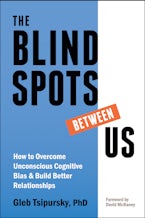By Gleb Tsipursky, PhD, author of The Blindspots Between Us
Your relationships will be undermined or even destroyed by the coronavirus (COVID-19), unless you take proactive steps right now to save them.
Don’t believe me? Consider the facts.
The COVID-19 coronavirus pandemic has led to extensive measures for social distancing, figuratively and literally. We’re asked to keep at six to ten feet apart from other people, and to not hold any gatherings over fifty people. Schools, colleges, day care facilities, restaurants, bars, and other public venues are shut down until further notice across the US. Entertainment venues, such as stadiums, theaters, and museums, have closed their doors. More and more companies are asking all employees who can work from home to do so. Those over the age of sixty, or whose health is compromised, are asked to stay home unless absolutely necessary, and you shouldn’t visit them if you don’t want to put them at risk.
Think it’s going to blow over in a couple of weeks? Think again.
The pandemic is only gaining steam instead of stopping, and will very likely be around for years, not weeks. All these changes are not emergency measures; they’re the new normal.
What will that do to your relationships?
- How will you maintain your romantic life at six to ten feet apart, with no restaurants, cafes, or bars as a place to hang out and no entertainment venues to attend?
- How about the same question for friendships?
- How will you support older adults you care about in this epidemic?
- What will you do about your friends and family who are waving off concerns about the coronavirus, and might end up in a tight spot in a few weeks or months when things get really bad?
- When working from home, what’s your plan for maintaining your professional collaborations and work relationships without seeing your co-workers face-to-face and working out challenges over the watercooler or in a staff meeting?
- What are you going to do with kids and young adults who are home instead of in school or college?
- Given that the whole family is at home, how will you avoid the little daily annoyances that can tear families apart?
- How will you make sure that you cope with the strain of the situation and avoid letting the natural feelings of fear, frustration, sadness, anxiety, and anger lead you to lash out at those closest to you?
That list may feel overwhelming, and you may feel anxious over not having answers to any of these questions. Yet before rushing into figuring out your answers, take a breather. Reflect on why you didn’t realize that you should think about these questions in the first place.
It’s because we all suffer from mental blindspots that scholars in cognitive neuroscience, psychology, and behavioral economics like myself call cognitive biases. They result from a combination of our evolutionary background and specific structural features in how our brains are wired.
Our primary threat response, which stems from the ancient savanna environment, is the fight-or-flight response, also known as the sabertooth tiger response. A great fit for the kind of short-term, intense risks we faced as hunter-gatherers, the fight-or-flight response results in terrible decisions in the modern environment. It’s particularly bad for defending our relationships from major disruptions caused by the slow-moving train wrecks we face in the modern environment, such as the COVID-19 pandemic.
More specifically, you need to watch out for three cognitive biases.
The normalcy bias causes our brains to assume things will keep going as they have been—normally—and evaluate the near-term future based on our short-term past experience. As a result, we drastically underestimate both the likelihood of a serious disruption occurring, and the impact of one if it does occur for our relationships and other life areas.
When we make plans, we naturally believe that the future will go according to plan. That wrongheaded mental blindspot—the planning fallacy—results in us not preparing for contingencies and problems, both predictable ones and unknown unknowns.
Last but not least, we suffer from the tendency to prioritize the short term, and undercount the importance of medium and long-term outcomes. Known as hyperbolic discounting, this cognitive bias is especially bad for evaluating the potential long-term impacts of the COVID-19 pandemic.
To protect yourself and those you care about from the devastating impact of the COVID-19 coronavirus pandemic, you need to learn about these cognitive biases, and the effective tools informed by cognitive-behavioral therapy (CBT) to defeat such mental blindspots. Only by doing so will you be able to answer the questions above effectively. You’ll not only save your relationships in these turbulent times, but also forge even stronger, healthier, and more meaningful relationships!
Gleb Tsipursky, PhD, is a cognitive neuroscientist and behavioral economist on a mission to protect people from relationship disasters caused by the mental blindspots known as cognitive biases, using cognitive-behavioral therapy (CBT)-informed strategies. His expertise comes from over fifteen years in academia researching cognitive neuroscience and behavioral economics, including seven as a professor at Ohio State University, where he published dozens of peer-reviewed articles in academic journals such as Behavior and Social Issues and Journal of Social and Political Psychology. His expertise also stems from his background of over twenty years of consulting, coaching, speaking, and training on improving relationships in business settings as CEO of Disaster Avoidance Experts.



 Why Journaling Is Especially Helpful to Adult Children of Emotionally Immature Parents
Why Journaling Is Especially Helpful to Adult Children of Emotionally Immature Parents